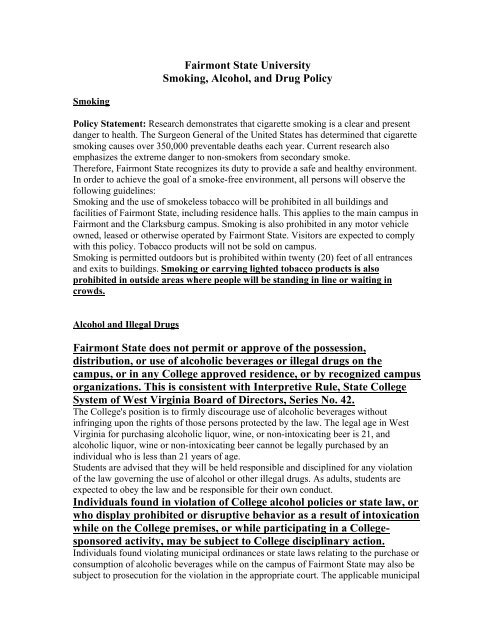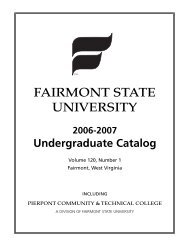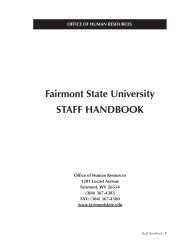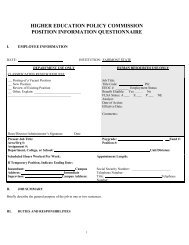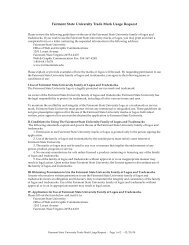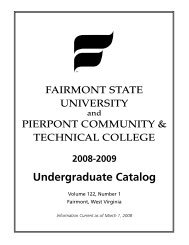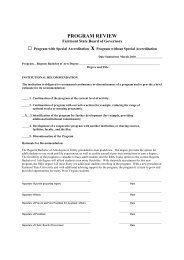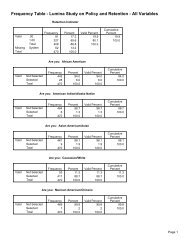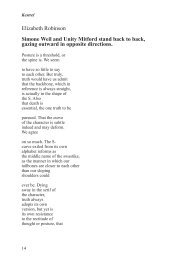Smoking alcohol and drugs policy - Fairmont State University
Smoking alcohol and drugs policy - Fairmont State University
Smoking alcohol and drugs policy - Fairmont State University
Create successful ePaper yourself
Turn your PDF publications into a flip-book with our unique Google optimized e-Paper software.
<strong>Smoking</strong><br />
<strong>Fairmont</strong> <strong>State</strong> <strong>University</strong><br />
<strong>Smoking</strong>, Alcohol, <strong>and</strong> Drug Policy<br />
Policy <strong>State</strong>ment: Research demonstrates that cigarette smoking is a clear <strong>and</strong> present<br />
danger to health. The Surgeon General of the United <strong>State</strong>s has determined that cigarette<br />
smoking causes over 350,000 preventable deaths each year. Current research also<br />
emphasizes the extreme danger to non-smokers from secondary smoke.<br />
Therefore, <strong>Fairmont</strong> <strong>State</strong> recognizes its duty to provide a safe <strong>and</strong> healthy environment.<br />
In order to achieve the goal of a smoke-free environment, all persons will observe the<br />
following guidelines:<br />
<strong>Smoking</strong> <strong>and</strong> the use of smokeless tobacco will be prohibited in all buildings <strong>and</strong><br />
facilities of <strong>Fairmont</strong> <strong>State</strong>, including residence halls. This applies to the main campus in<br />
<strong>Fairmont</strong> <strong>and</strong> the Clarksburg campus. <strong>Smoking</strong> is also prohibited in any motor vehicle<br />
owned, leased or otherwise operated by <strong>Fairmont</strong> <strong>State</strong>. Visitors are expected to comply<br />
with this <strong>policy</strong>. Tobacco products will not be sold on campus.<br />
<strong>Smoking</strong> is permitted outdoors but is prohibited within twenty (20) feet of all entrances<br />
<strong>and</strong> exits to buildings. <strong>Smoking</strong> or carrying lighted tobacco products is also<br />
prohibited in outside areas where people will be st<strong>and</strong>ing in line or waiting in<br />
crowds.<br />
Alcohol <strong>and</strong> Illegal Drugs<br />
<strong>Fairmont</strong> <strong>State</strong> does not permit or approve of the possession,<br />
distribution, or use of <strong>alcohol</strong>ic beverages or illegal <strong>drugs</strong> on the<br />
campus, or in any College approved residence, or by recognized campus<br />
organizations. This is consistent with Interpretive Rule, <strong>State</strong> College<br />
System of West Virginia Board of Directors, Series No. 42.<br />
The College's position is to firmly discourage use of <strong>alcohol</strong>ic beverages without<br />
infringing upon the rights of those persons protected by the law. The legal age in West<br />
Virginia for purchasing <strong>alcohol</strong>ic liquor, wine, or non-intoxicating beer is 21, <strong>and</strong><br />
<strong>alcohol</strong>ic liquor, wine or non-intoxicating beer cannot be legally purchased by an<br />
individual who is less than 21 years of age.<br />
Students are advised that they will be held responsible <strong>and</strong> disciplined for any violation<br />
of the law governing the use of <strong>alcohol</strong> or other illegal <strong>drugs</strong>. As adults, students are<br />
expected to obey the law <strong>and</strong> be responsible for their own conduct.<br />
Individuals found in violation of College <strong>alcohol</strong> policies or state law, or<br />
who display prohibited or disruptive behavior as a result of intoxication<br />
while on the College premises, or while participating in a Collegesponsored<br />
activity, may be subject to College disciplinary action.<br />
Individuals found violating municipal ordinances or state laws relating to the purchase or<br />
consumption of <strong>alcohol</strong>ic beverages while on the campus of <strong>Fairmont</strong> <strong>State</strong> may also be<br />
subject to prosecution for the violation in the appropriate court. The applicable municipal
ordinances or state laws include under-age consumption of <strong>alcohol</strong>ic beverages, open<br />
containers of beer or <strong>alcohol</strong>ic beverages in a public place, use of false or altered<br />
identification, <strong>and</strong> public intoxication. The imposition of disciplinary proceedings is not<br />
dependent upon nor determined by existence or outcome of any criminal prosecution.<br />
Counseling services are available for students who are concerned about their drinking or<br />
drug abuse. The staff responsible for this program are not people who will judge you,<br />
criticize you, or moralize with you about your health <strong>and</strong> well-being. They are there to<br />
listen to you, to help you underst<strong>and</strong> the nature of <strong>alcohol</strong> <strong>and</strong> drug abuse <strong>and</strong> to suggest<br />
a program, if appropriate, to meet your needs. For more information, call 367-4792 or<br />
refer to the College Catalog.<br />
Parental Notification of Alcohol <strong>and</strong> Drug violations<br />
The Higher Education Amendments of 1998 provides that:<br />
"(i) DRUG AND ALCOHOL VIOLATION DISCLOSURES<br />
Nothing in this Act or the Higher Education Act of 1965 shall be construed to prohibit an<br />
institution of higher education from disclosing, to a parent or legal guardian of a student,<br />
information regarding any violation of any Federal, <strong>State</strong>, or local law, or of any rule or<br />
<strong>policy</strong> of the institution, governing the use or possession of <strong>alcohol</strong> or a controlled<br />
substance, regardless of whether that information is contained in the student's education<br />
record, if -<br />
(A) the student is under the age of 21; <strong>and</strong><br />
(B) the institution determines that the student has committed a disciplinary violation with<br />
respect to such use or possession."<br />
<strong>Fairmont</strong> <strong>State</strong> Policy: Per the guidlines of the Higher Education Amendments of 1998,<br />
<strong>Fairmont</strong> <strong>State</strong> will notify the parents or legal guardians of under 21 students who are<br />
involved in disruptive or inappropriate behavior or incidents which results in residence<br />
hall or campus disciplinary action <strong>and</strong> which involve the legal use or possession of<br />
<strong>alcohol</strong> or <strong>drugs</strong>.<br />
3. DUI - Driving under influence.<br />
a. Drunk Driving (DUI) penalties WV Code 17C-5-2; 17B-4-3<br />
(1) Drunk driving causing death of other person can be a FELONY, carries 1-10 years<br />
PENTITENTIARY sentence; a $1-3,000 fine <strong>and</strong> driver’s license suspension for 10<br />
years. Depending on the facts, the charge can be a misdemeanor carrying a 90 day to 1<br />
year jail sentence; a fine of $500-1,000 <strong>and</strong> a license suspension of 5 years. Subsequent<br />
convictions of same charge carry stiffer penalties.<br />
(2) Drunk driving causing injury to other person carries a jail sentence of 24 hours to 1<br />
year; a fine of $200-1,000 <strong>and</strong> license suspension of 2 years. Subsequent convictions of<br />
same charge carry stiffer penalties.<br />
(3) FIRST offense drunk driving, a misdemeanor, carries jail sentence of 24 hours to 6<br />
months; a fine of $1-500 <strong>and</strong> license suspension of 6 months.<br />
SECOND offense drunk driving, a misdemeanor, carries jail sentence of 6 months to 1<br />
year; a fine of $1-3,000 <strong>and</strong> license suspension of 10 years.<br />
THIRD <strong>and</strong> subsequent offense drunk driving, a FELONY, carries a PENITENTIARY<br />
sentence of 1-3 years; a fine of $3-5,000 <strong>and</strong> LIFETIME license suspension.<br />
(4) Permitting an intoxicated person to drive your car carries the same penalties for you,<br />
the owner, as for the drunk driver.
(5) Driving while your license has been suspended for prior DUI carries the following<br />
penalties:<br />
FIRST OFFENSE - jail sentence of 6 months, fine of $1-500 <strong>and</strong> continued license<br />
suspension.<br />
SECOND OFFENSE - jail sentence of 1 year, fine of $1-3,000 <strong>and</strong> continued license<br />
suspension.<br />
THIRD OFFENSE - FELONG - PENITENTIARY sentence of 1-3 years, fine of $3-<br />
5,000 <strong>and</strong> continued license suspension.<br />
<strong>State</strong>d minimum sentences are MANDATORY. Penalties are the same for driving under<br />
the influence of DRUGS. Prior convictions from other states may be considered by a<br />
West Virginia Court.<br />
D. Prohibited Areas<br />
Possession or use of <strong>alcohol</strong>ic beverages is prohibited on or in property or facilities<br />
(including student housing) of public colleges <strong>and</strong> universities except as allowed under<br />
PB 14 or in dwellings located thereon <strong>and</strong> occupied as a family residence.<br />
Anyone violating <strong>Fairmont</strong> <strong>State</strong> Universities Drug <strong>and</strong><br />
Alcohol <strong>policy</strong> will not only face disciplinary actions<br />
from the <strong>University</strong> <strong>and</strong> <strong>State</strong> Police, but will be banned<br />
from any <strong>and</strong> all future outdoor recreation activities<br />
<strong>and</strong> trips sponsored by the Outdoor Recreation<br />
Leadership program.<br />
Student Contract<br />
I (print)______________________________, have read the above <strong>policy</strong><br />
<strong>and</strong> agree to follow all rules <strong>and</strong> regulations that relate to <strong>Fairmont</strong><br />
<strong>State</strong>s’ tobacco, <strong>drugs</strong>, <strong>and</strong> <strong>alcohol</strong> <strong>policy</strong>.<br />
Students’ signature: _______________________________________<br />
Date __________________
F. General Facts<br />
Alcohol is the most commonly used drug on campus. Whether you are over or under the<br />
legal drinking age, you cannot avoid making decisions about drinking - at parties, on<br />
dates, in your room. Your decisions can increase your risk of flunking courses, getting a<br />
sexually transmitted disease, <strong>and</strong> being involved in fights <strong>and</strong> accidents. They can also<br />
increase your risk of developing a long-term drinking problem.<br />
1. Sticking to your limits<br />
You can stay in control of situations that involve <strong>alcohol</strong> even though others may<br />
pressure you to change your mind. First <strong>and</strong> foremost, you will find it easier to stick to<br />
your limits if you decide in advance what they are.<br />
Here are some other tips that may help:<br />
It is always okay to refuse a drink. Be polite but firm in your refusal <strong>and</strong> maintain eye<br />
contact. If the offer is repeated, you can still stick to your decision. Say that you prefer<br />
not to be asked again, or that you prefer not to drink <strong>alcohol</strong> today. In some instances,<br />
you might need to walk away or reverse the pressure with a comment like, "Why is it so<br />
important to you that I have another drink?”<br />
Before entering a bar or other place where <strong>alcohol</strong> is available, decide how much you<br />
plan to drink. Know what non-<strong>alcohol</strong>ic beverage you will use as a substitute once you<br />
reach your predetermined <strong>alcohol</strong> limit. Soda, juice, <strong>and</strong> mineral or carbonated spring<br />
water are among the choices. And they can be ordered with a twist of lemon or lime if<br />
you want your drink to look like it contains <strong>alcohol</strong>.<br />
Get involved in a range of activities that you enjoy. This will help you make friendships<br />
that are not focused on <strong>alcohol</strong> <strong>and</strong> enable you to suggest alternative activities to friends<br />
with whom you habitually drink.<br />
2. Control<br />
The best way to stay in control in any situation is not to drink. But if you choose to drink:<br />
- Limit the amount you drink.<br />
- Sip drinks slowly.<br />
- Space your drink over time.<br />
- Eat heavy meals or dairy products before or while drinking. (These foods slow down<br />
<strong>alcohol</strong> absorption.)<br />
- Avoid salty foods (such as salted peanuts or popcorn) that make you more thirsty.<br />
- Drink diluted <strong>alcohol</strong>ic beverages - beer, wine <strong>and</strong> mixed drinks - rather than "straight<br />
shots.”<br />
- Avoid carbonated mixers or sparkling wines - they speed up <strong>alcohol</strong> absorption into<br />
your blood stream.<br />
- Avoid "spiked” punch, <strong>and</strong> other drinks containing unknown amounts of <strong>alcohol</strong>.<br />
3. A guide to responsible hosting<br />
Alcohol by itself is neither good nor bad, <strong>and</strong> the majority of those who use it do so for<br />
enjoyment <strong>and</strong> suffer few serious consequences from that use. Alcohol, however, is a<br />
very powerful <strong>and</strong> potentially harmful drug. when used irresponsibly. As host or hostess<br />
to a function involving <strong>alcohol</strong>, there are a few simple thoughts to keep in mind to insure<br />
that everyone has a good time, <strong>and</strong> no one gets hurt!<br />
a. Ask yourself what the real purpose of the event is. Alcohol is often most successfully<br />
used when it is an adjunct to other activities, such as conversation, dancing, cards,
pinball, or other sports.<br />
b. Provide alternative beverages, such as fruit juices <strong>and</strong> soft drinks. There are a sizable<br />
number of people who choose not to drink <strong>alcohol</strong>, <strong>and</strong> their rights should be respected.<br />
c. Don’t push drinks on your guests. People who drink at a slower pace often enjoy<br />
themselves more, <strong>and</strong> it is rude to force booze on others.<br />
d. Try to create a relaxed atmosphere in which people can get to know one another. This<br />
means having the music at a level where people can converse <strong>and</strong> being sure that<br />
introductions are made.<br />
e. Serve food along with drinks. This slows the absorption of <strong>alcohol</strong> into the<br />
bloodstream. Both food <strong>and</strong> <strong>alcohol</strong> are enhanced when served together.<br />
f. Regulate the flow of booze. You may have one person be bartender for the night. If an<br />
<strong>alcohol</strong>ic punch is served, use a non-carbonated base such as fruit juice, which will<br />
provide slower absorption than carbonated mixers. If you have a keg of beer, you might<br />
consider having it located somewhere other than the center of the room.<br />
g. Stop serving liquor about a hour before the party ends. Some people may get upset, but<br />
offering food or non-<strong>alcohol</strong>ic beverages will provide time for the <strong>alcohol</strong> to begin<br />
wearing off before people go home.<br />
h. If someone has had too much to drink, stop serving them. This is oftentimes hard, but<br />
you may be keeping someone from real harm by this simple act of caring.<br />
i. If some of your friends are planning to drive home <strong>and</strong> you feel they have had too<br />
much to drink, try to get them to take a taxi, or you might give them a ride. If possible,<br />
you could provide them a place to sleep. Again, this simple measure can prevent<br />
enormous damage.<br />
Illicit Drug Use<br />
Classes of Drugs.<br />
Drugs have saved lives, have greatly reduced human suffering <strong>and</strong> have improved the<br />
quality of our lives. In our society there is a huge variety of <strong>drugs</strong> available - both legally<br />
<strong>and</strong> illegally. One class of <strong>drugs</strong> is most frequently used socially or recreationally - the<br />
psychoactive <strong>drugs</strong>. These <strong>drugs</strong> are used because of the pleasurable feelings they induce.<br />
Marijuana, <strong>alcohol</strong>, cocaine, <strong>and</strong> Valium are examples of different kinds of psychoactive<br />
<strong>drugs</strong>. Decisions regarding the social use of these <strong>drugs</strong> are personal, <strong>and</strong> should be based<br />
on a general awareness of the risks <strong>and</strong> benefits of the use of each drug.<br />
Psychoactive <strong>drugs</strong> act on the central nervous system - the brain. They may increase its<br />
activity (stimulants), decrease its activity (depressants) or cause the creation of<br />
hallucinations (hallucinogens). Every drug has multiple effects. While you may only<br />
focus on one aspect of the drug’s effect, it is acting at many different locations in your<br />
brain. The effects of the drug will depend on the dosage taken - usually a higher dose will<br />
intensify the effects.<br />
Effects of Drugs.<br />
Several terms will be defined to provide a sound underst<strong>and</strong>ing of <strong>drugs</strong>’ effects. The<br />
first is the concept of tolerance. Tolerance means that your body has become adapted to<br />
the drug, <strong>and</strong> that you need increasingly larger doses to produce the original desired<br />
effect. Think back to your first drink of <strong>alcohol</strong>. Perhaps you felt giddy, even drunk, after<br />
half a glass of wine, or one beer. If you can drink more than that now without having
those same effects, then you’ve developed tolerance to <strong>alcohol</strong>. Tolerance does develop<br />
to the psychoactive <strong>drugs</strong>.<br />
The next concept is dependence. Dependence, either psychological or physical, is defined<br />
as when a person cannot, or feels they cannot, function without the drug. With physical<br />
dependence, your body has gotten used to the presence of the drug. When it is not<br />
present, the individual will experience withdrawal symptoms which can be unpleasant,<br />
painful, <strong>and</strong> sometimes life threatening. With a psychological dependence, a person may<br />
feel restless <strong>and</strong> anxious when the drug is not present, but usually there is no physical<br />
illness.<br />
The last term to be defined is the phenomenon known as synergism. When two or more<br />
<strong>drugs</strong> with similar effects are taken together or in sequence, their effects may be<br />
potentiated - made stronger than their additive sum. In other words, 1 plus 1 may equal 4,<br />
5, 6, or more!<br />
Alcohol Effects<br />
Alcohol consumption causes a number of marked changes in behavior. Even low doses<br />
significantly impair the judgment <strong>and</strong> coordination required to drive a car safely,<br />
increasing the likelihood that the driver will be involved in an accident. Low to moderate<br />
doses of <strong>alcohol</strong> also increase the incidence of a variety of aggressive acts, including<br />
spouse <strong>and</strong> child abuse. Moderate to high doses of <strong>alcohol</strong> cause marked impairments in<br />
higher mental functions, severely altering a person’s ability to learn <strong>and</strong> remember<br />
information. Very high doses cause respiratory depression <strong>and</strong> death. If combined with<br />
other depressants of the central nervous system, much lower doses of <strong>alcohol</strong> will<br />
produce the effects just described.<br />
Repeated use of <strong>alcohol</strong> can lead to dependence. Sudden cessation of <strong>alcohol</strong> intake is<br />
likely to produce withdrawal symptoms, including severe anxiety, tremors,<br />
hallucinations, <strong>and</strong> convulsions. Alcohol withdrawal can be life threatening. Long-term<br />
consumption of large quantities of <strong>alcohol</strong>, particularly when combined with poor<br />
nutrition, can also lead to permanent damage of vital organs such as the brain <strong>and</strong> the<br />
liver.<br />
Mothers who drink <strong>alcohol</strong> during pregnancy may give birth to infants with fetal <strong>alcohol</strong><br />
syndrome. These infants have irreversible physical abnormalities <strong>and</strong> mental retardation.<br />
In addition, research indicates that children of <strong>alcohol</strong>ic parents are at greater risk than<br />
other youngsters of becoming <strong>alcohol</strong>ics.<br />
Alcohol <strong>and</strong> Drug Education Programs<br />
<strong>Fairmont</strong> <strong>State</strong> College’s Office of Student Affairs has been systematically addressing<br />
<strong>alcohol</strong> <strong>and</strong> other drug problems on campus. These programs provide structure,<br />
coordination, <strong>and</strong> support for a number of other programs which have evolved <strong>and</strong><br />
continue to evolve on campus. The programs coexist on campus <strong>and</strong> attempt to work<br />
together in a coordinated fashion to reduce <strong>alcohol</strong> <strong>and</strong> other drug problems.<br />
We attempt to coordinate our campus efforts with local <strong>and</strong> regional programs. National<br />
Collegiate Alcohol Awareness Week programs have become an integral part of our<br />
campus activities <strong>and</strong> have been used as a springboard for the year’s <strong>alcohol</strong>/drug<br />
education efforts. Through the NCAAW programs, there has been greater interaction<br />
between the College community <strong>and</strong> community agencies to enhance one another’s<br />
awareness of problems, intervention/prevention programs <strong>and</strong> resources available.
Events <strong>and</strong> expressed concerns pointed to the need for a program to address <strong>and</strong> alleviate<br />
problems. Thus, our objectives have been to simply provide programs that:<br />
A. make a special effort to reach the freshmen.<br />
B. create an awareness of drinking patterns on campus.<br />
C. make resource information about where to go for counseling, legal assistance <strong>and</strong><br />
information available to students.<br />
D. inform students of the college policies on <strong>alcohol</strong> use, penalties for violation <strong>and</strong><br />
judiciary process.<br />
E. involve Greek organizations in finding creative ways to socialize without <strong>alcohol</strong>.<br />
F. involve student organizations in such a way that the entire student body would<br />
participate in the programs.<br />
G. support <strong>and</strong> encourage faculty in incorporating <strong>alcohol</strong> <strong>and</strong> other drug education into<br />
the curriculum.<br />
Our student assistance programs focus not only on students with problems, but also on<br />
students at risk for problems. Awareness education is a primary function of our <strong>alcohol</strong><br />
<strong>and</strong> drug education programs.<br />
Available Resources.<br />
A. Community Assistance Programs - Counseling <strong>and</strong> Support<br />
Alcoholic Anonymous, <strong>Fairmont</strong>, WV 26554, 363-5043<br />
Al-Anon <strong>and</strong> Alateen, <strong>Fairmont</strong>, WV 26554, 363-5043<br />
Al-Anon is an anonymous fellowship of relatives <strong>and</strong> friends of <strong>alcohol</strong>ics.<br />
Their one purpose is to help families of <strong>alcohol</strong>ics.<br />
Narcotics Anonymous, Charleston, WV, Helpline: 1-344-4442<br />
Summit Center for Human Development<br />
6 Hospital Plaza, Clarksburg, WV 26301, 1-800-352-3869<br />
Valley Community Mental Health Center<br />
Alcoholism <strong>and</strong> Drug Abuse Program<br />
Pleasant Valley Road, <strong>Fairmont</strong>, WV 26554, 366-7174<br />
B. College Assistance Programs - Counseling <strong>and</strong> Support<br />
Student Assistance Program<br />
College Counseling Services<br />
Office of Student Affairs, 367-4215<br />
Counseling is available for students who are concerned about their drinking<br />
or drug use, a friend’s drinking or drug use, or about <strong>alcohol</strong> <strong>and</strong> drug<br />
misuse in their families.<br />
Community Assistance Program<br />
<strong>Fairmont</strong> General Hospital Addiction Recovery Unit<br />
1325 Locust Avenue, <strong>Fairmont</strong>, WV 26554, 367-7239<br />
C. Speaker Resources
Chestnut Ridge Hospital, 930 Chestnut Ridge Road<br />
Morgantown, WV 26505, 293-2411<br />
Contact: Pam Sullivan, M.D., Cheryl Riley, M.A.<br />
Valley Community Mental Health Center<br />
Pleasant Valley Road, <strong>Fairmont</strong>, WV 26554, 366-7174<br />
Mimmi Byrne, ACSW, CAC<br />
Wedgewood Family Practice <strong>and</strong> Psychiatry<br />
1197 Van Voorhis Road, Morgantown, WV 26505, 599-9400<br />
D. Print <strong>and</strong> Audio-Visual Resources<br />
Clearinghouse for Alcohol <strong>and</strong> Drug Information<br />
Rockville, MD, 301-443-6500<br />
West Virginia <strong>University</strong> Department of Health<br />
Behavioral Health, 1800 Washington Street, East<br />
Charleston, WV 25305, 348-2276<br />
Contact: Mary Petsky<br />
Governor’s Office of Highway Safety<br />
5790-A MacCorkle Avenue, Charleston, WV 25304, 348-8814<br />
Contact: Jim Grate<br />
BACCHUS of the United <strong>State</strong>s, Inc.<br />
P.O. Box 10430, Denver, CO 80210, (304) 871-3068<br />
West Virginia Library Commission<br />
Cultural Center - Film Services, Charleston, WV 25305<br />
348-3976, Contact: Steve Fesenmair<br />
E. Emergency/Medical Treatment<br />
Emergency Medical Squad, <strong>Fairmont</strong>, WV 26554, 367-9111<br />
<strong>Fairmont</strong> General Hospital, Addiction Recovery Unit<br />
1325 Locust Avenue. <strong>Fairmont</strong>, WV 26554, 367-7239<br />
Chestnut Ridge Hospital, Addiction Recovery Unit<br />
930 Chestnut Ridge Road, Morgantown, WV 26505, 293-4000<br />
<strong>University</strong> Health Service<br />
Health Science Center - South, Ground Floor<br />
Hours of operation: M-F, 8:30 to 5:00<br />
Limited service: M-F, 5:00 to 8:00 PM,<br />
Sat. 9 to 12 noon Sunday 1 to 4 PM<br />
For an appointment, call 293-2311<br />
St. Joseph’s Hospital Restore Program<br />
Amalia Drive, Buckhannon, WV, 472-5922<br />
Harold Hughes Center of Ligonier, Inc.
Rd. 1, P.O. Box 90, Stahlstown, PA, 412-593-6311<br />
Olympic Center - Preston, Route 1, Kingwood, WV 329-2400<br />
Preston Addiction Treatment Center<br />
Preston Memorial Hospital, Kingwood, WV, 1-800-352-3802<br />
Summit Center for Human Development<br />
6 Hospital Plaza, Clarksburg, WV 26301, 1-800-352-3869<br />
Valley Community Mental Health Center<br />
301 Scott Avenue, Morgantown, WV 26505, 296-1731<br />
Greenbrier Treatment Center, Washington, PA, 412-225-9700<br />
Gateway Treatment Center, Pittsburgh, PA, 412-928-5940<br />
Substance Abuse Quiz<br />
Do you think drinking is all fun <strong>and</strong> games? Most of you have used <strong>alcohol</strong> <strong>and</strong>/or other <strong>drugs</strong><br />
at one time or another. Most of you will be surprised to learn that one out of every ten who<br />
use <strong>alcohol</strong> or other <strong>drugs</strong> may someday become addicted. So take this simple test. Answer<br />
these 20 questions <strong>and</strong> find out about yourself. Please be as honest as you can.<br />
Yes No<br />
___ ___ 1. Do you lose time from school due to drinking or using <strong>drugs</strong>?<br />
___ ___ 2. Do you drink or use <strong>drugs</strong> to feel more comfortable?<br />
___ ___ 3. Do you drink or use <strong>drugs</strong> to build self-confidence?<br />
___ ___ 4. Do you drink or use <strong>drugs</strong> alone?<br />
___ ___ 5. Is drinking or using <strong>drugs</strong> affecting your reputation?<br />
___ ___ 6. Do you drink or use <strong>drugs</strong> to escape from studies or home worries?<br />
___ ___ 7. Do you feel guilty after drinking or using <strong>drugs</strong>?<br />
___ ___ 8. Does it bother you if someone says that you drink or use <strong>drugs</strong> too much?<br />
___ ___ 9. Do you feel more at ease on a date when drinking or using <strong>drugs</strong>?<br />
___ ___ 10. Have you gotten into trouble at home because or your drinking/using <strong>drugs</strong>?<br />
___ ___ 11. Do you borrow money or 'do without’ other things so you can buy liquor/<strong>drugs</strong>?<br />
___ ___ 12. Do you feel a sense of power when you drink or use <strong>drugs</strong>?<br />
___ ___ 13. Have you lost friends since you started drinking or using <strong>drugs</strong>?<br />
___ ___ 14. Do your friends drink or get high less than you do?<br />
___ ___ 15. Have you started hanging out with a heavy drinking or "drug” crowd?<br />
___ ___ 16. Do you drink until all the liquor is gone?<br />
___ ___ 17. Do you ever wake up <strong>and</strong> wonder what happened the night before?<br />
___ ___ 18. Have you ever been busted or hospitalized because of drinking/using <strong>drugs</strong>?<br />
___ ___ 19. Do you 'turn off’ studies or lectures on <strong>alcohol</strong> or drug abuse?<br />
___ ___ 20. Do you think you have a problem with <strong>alcohol</strong> <strong>and</strong> <strong>drugs</strong>?<br />
If you answered "yes” to three or more of these questions, or if your answer to any of the<br />
questions concerns you, you may be using <strong>alcohol</strong> <strong>and</strong>/or <strong>drugs</strong> in ways that are harmful. Do<br />
not waste time blaming yourself for past behavior. If you think you have or might be<br />
developing problems in which drinking or <strong>drugs</strong> plays a part, act now. You can get help.<br />
For more information <strong>and</strong> counseling, contact your counseling center (Student Affairs Office),<br />
student health center, or community mental health facility.


